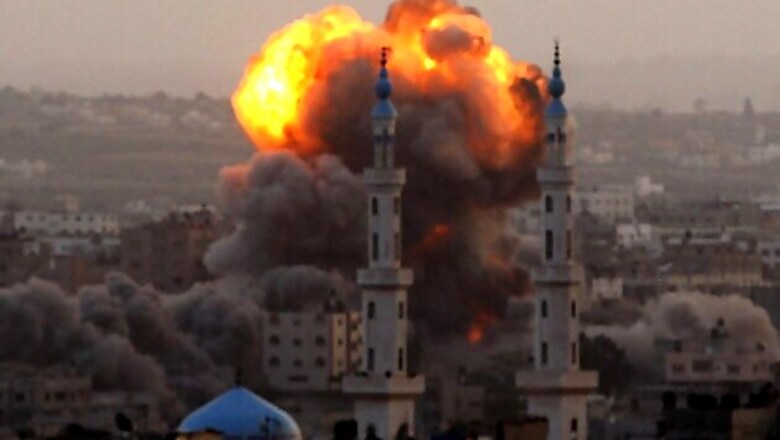
views
Israel bombarded the Hamas-ruled Gaza Strip with about 300 airstrikes on Saturday and shot down a Palestinian rocket fired at Tel Aviv, the military said, widening a blistering assault to include the Hamas prime minister's headquarters, a police compound and a vast network of smuggling tunnels.
The intensified airstrikes came as Egyptian-led attempts to broker a cease-fire and end Israel's four-day-old Gaza offensive gained momentum. The leaders of Hamas and two key allies, Qatar and Turkey, were in Cairo for talks with Egyptian officials, and the Arab League was holding an emergency meeting.
The White House said President Barack Obama was also in touch with the Egyptian and Turkish leaders. The US has solidly backed Israel so far. Speaking on Air Force One, deputy national security adviser Ben Rhodes said that the White House believes Israel "has the right to defend itself" against attack and that the Israelis will make their own decisions about their "military tactics and operations."
The Israeli attacks, which Gaza officials say left 12 dead, came as Palestinian militants fired more than 100 rockets toward Israel, including two aimed at the commercial and cultural centre of Tel Aviv. Rocket attacks on Tel Aviv and Jerusalem this week mark the first time Gaza militants have managed to fire rockets toward the cities, raising the stakes in the confrontation.
The widened scope of targets brings the scale of fighting closer to that of the war the two groups waged four years ago. Hamas was badly bruised during that conflict, but has since restocked its arsenal with more and better weapons, and has been under pressure from smaller, more militant groups to prove its commitment to fighting Israel.
Israel started its massive air campaign on Wednesday with the declared aim of deterring Hamas from launching rockets that have plagued its southern communities for years. The operation has drawn Western support for what US and European leaders have called Israel's right to self-defence, along with appeals to both sides to avoid civilian casualties.
Hamas, shunned by the West over its refusal to recognise Israel, says its cross-border attacks have come in response to Israeli strikes against Palestinian fighters in Gaza. "We have not limited ourselves in means or in time," Israeli Foreign Minister Avigdor Lieberman said on Israel's Channel One television. "We hope that it will end as soon as possible, but that will be only after all the objectives have been achieved."
Hamas says it is committed to continued confrontation with Israel and is eager not to seem any less resolute than smaller, more radical groups that have emerged in Gaza in recent years. The Islamist movement has ruled Gaza since 2007. Israel pulled settlers out of Gaza in 2005 but has maintains a blockade of the tiny, densely populated coastal territory.



















Comments
0 comment